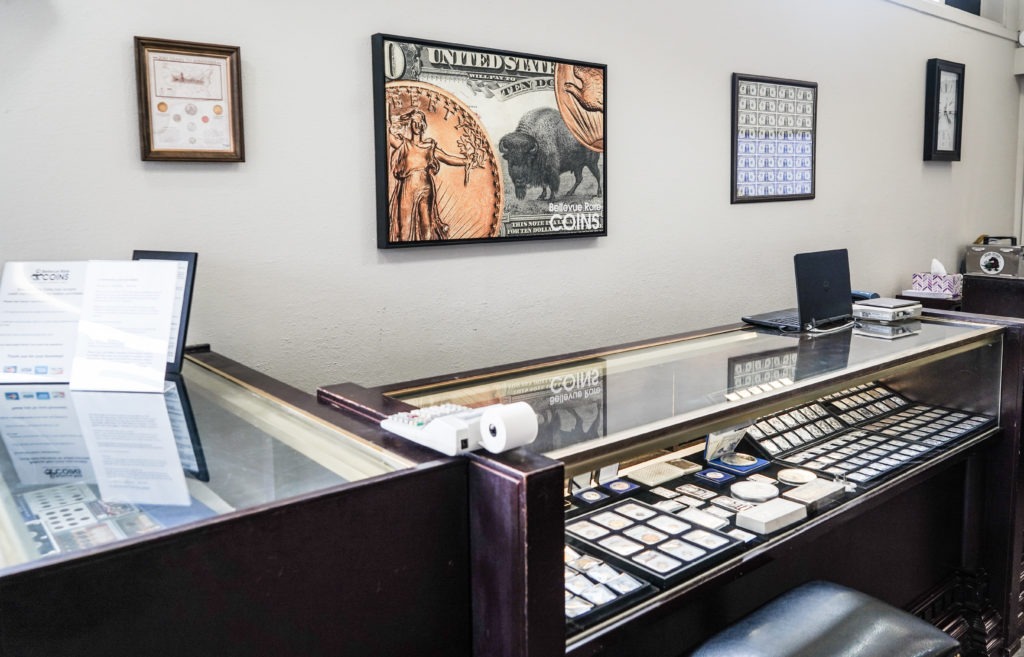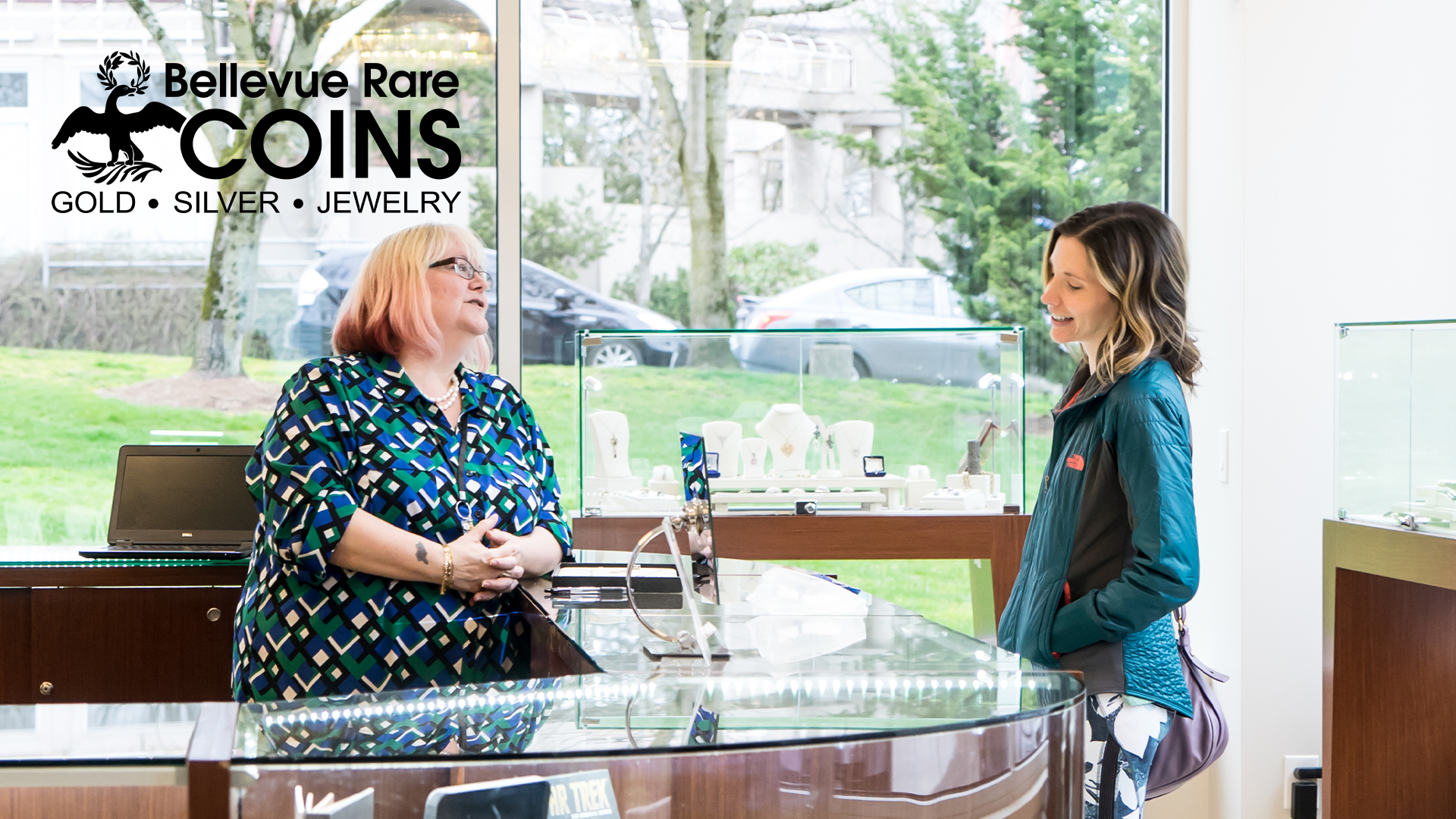If you have gold or silver bullion, old gold coins, or even alternative precious metals like platinum, you may be wondering where to sell them. It’s an important decision to make, as where you sell will directly influence how much you can get for your valuables.
In most cases, you will have three main options:
a.) Selling locally, to a coin shop or bullion dealer
b.) Selling online, to an online bullion dealer
c.) Selling online, using a platform like eBay
This article will explore all three options, describing how each works and the advantages and disadvantages of each.
Selling Bullion Locally

The first option is to sell your silver or gold to a local bullion dealer or coin shop. This is the preferred option, in many cases.
Here’s how it works:
- You can research local coin shops in your area to read reviews. For Seattle-area readers, the best option is Bellevue Rare Coins.
- After selecting an option, you can visit the store or make an appointment if they support that.
- A staff member will evaluate your items and make you an offer to purchase them.
- This is a no-obligation offer, which you can decide to accept or deny.
- If you accept, you can make the transaction and walk out same-day with your payment.
That’s it, really! Selling to a local business is quite simple, and quick. Here are the pros and cons of this approach:
Pros
- It’s quick and easy
- You can get paid same-day
- You don’t have to bother with shipping or long waits
- You don’t have to worry about items getting lost in the mail
- You can sell gold, silver, coins, jewelry and more
- You can ask questions and get advice from the store staff
- Reputable coin shops will pay top-dollar for your items
- You can buy, sell and trade in the same place
Cons
- In some areas, you may not have many local options
- If your only options are pawn shops or “we buy gold” places, you’re better off selling online, as these businesses pay less than your items are worth
In most cases, selling locally is ideal. It’s quicker, easier, and in many ways safer, as you don’t have to risk mailing items.
For those in the Pacific Northwest, Bellevue Rare Coins is a great option. Learn more about selling valuables in Seattle here.
Selling Bullion Online (To a Dealer)
The other main option is selling gold or silver online to online coin shops/bullion dealers.
Here’s how it works (each company will have a slightly different process):
- You can contact an online dealer to request a price quote.
- Usually this is done via phone.
- Some dealers will provide an exact price quote, while others will ask you to mail in the items first.
- In some cases, you can lock in a price based on the current spot price, before you mail in your items.
- You then mail your items to the dealer. You may or may not need to pay for shipping.
- The dealer will evaluate your items. If all checks out, they will mail you a check.
This process can take 1-2 weeks, depending on the dealer. You first have to mail the items, wait for them to process them, and then wait for a check in the mail.
Here are the pros and cons to this approach:
Pros
- You can sell most items
- Online dealers may offer better pricing than coin shops in small towns
- You can do most of it from home
- You can typically lock in a price at the initial contact point
Cons
- It can take a while
- You have to physically mail items, which can be risky
- There’s more of a paper trail
- Dealers must manually examine your items to confirm that they are purchasable
Selling bullion to an online dealer carries a bit more risk, but this can be minimized by using insured shipping methods. Other than that, the main downside is that it takes a while.
If you live in a rural area without access to a quality coin shop, selling online may be a better option. If not, it’s best to stick to coin shops and local bullion dealers.
Selling Bullion Online (on eBay or Similar)
Here’s a third bonus option: Selling bullion via eBay or another similar platform.
This method carries much more risk, because you can be scammed or have your items sell for less than they are worth. It’s typically only worthwhile for more collectible items, which may fetch a premium on these sites.
- Create an account with eBay or another online marketplace.
- Take pictures of and write a description for your items.
- List the items on eBay.
- Set a price, or set the listing up as an auction.
- Wait for the item to sell
- Ship the items to your buyers.
- You will be paid via eBay’s payment processing system, which connects to your bank account.
- You will have to pay a substantial fee to eBay.
Overall, this method is not recommended unless you’re an experienced eBay seller. There are substantial risks.
Pros
- You can sell just about any item
- Collectible items may fetch a good price
- You can customize listings (fixed price or auction)
Cons
- It’s possible to be scammed
- There are high fees to use the platform
- You have to ship your items at your own cost (or charge the buyer extra)
- It may be difficult to sell high-value items on a new eBay account without any feedback
In most cases, it’s best to avoid selling bullion on eBay unless you are an experienced seller.

